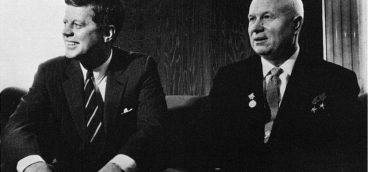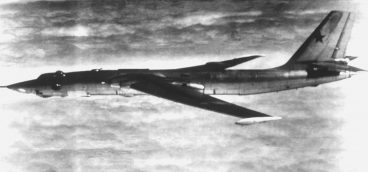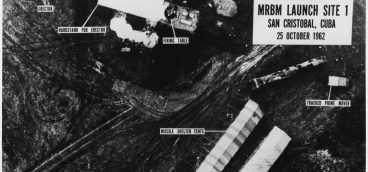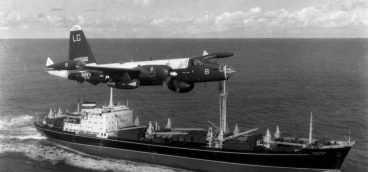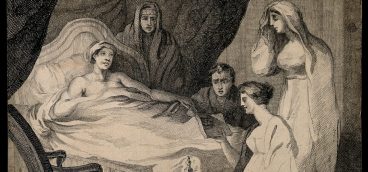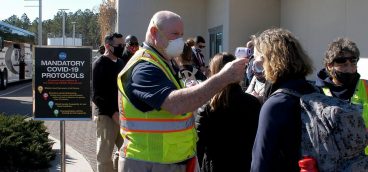Who Blinked?
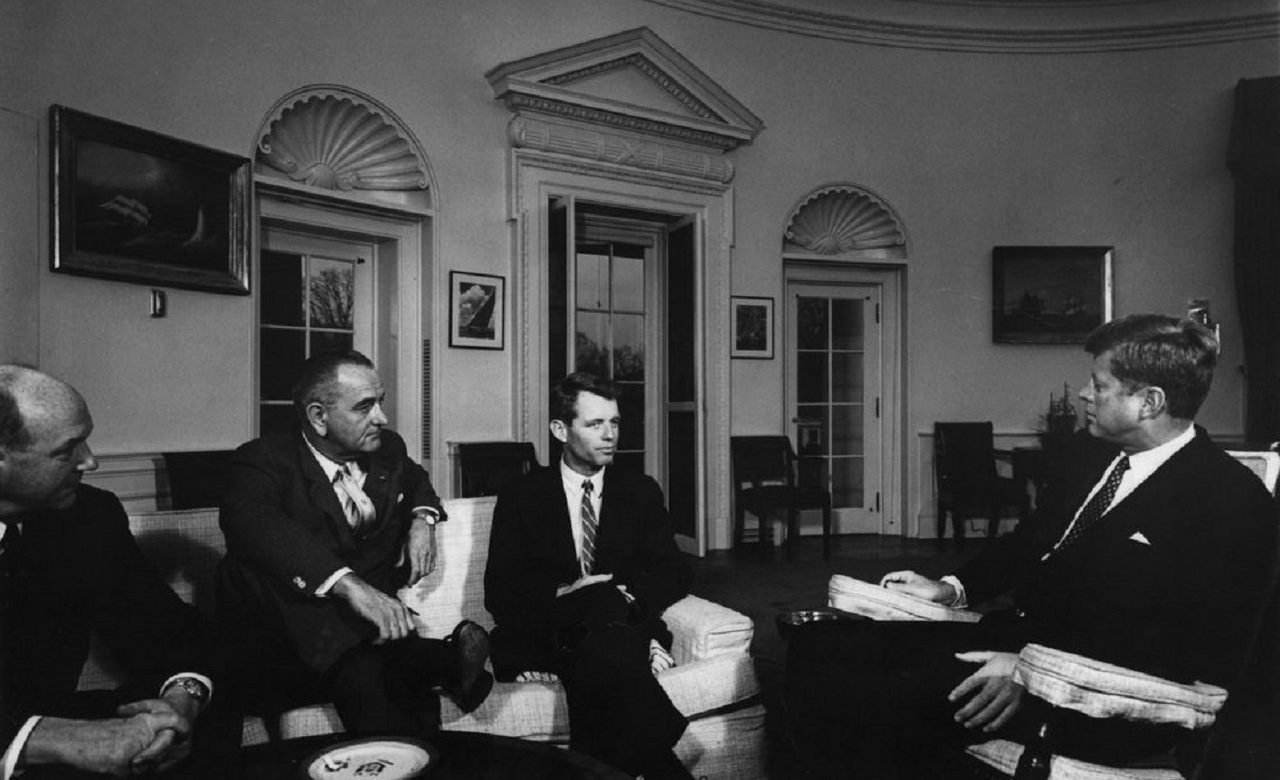
As we noted last week, several days into the Cuban Missile Crisis, President Kennedy began to receive almost bizarre letters from Nikita Khrushchev – long, disjointed missives that seemed to be almost steam-of-conscious ramblings. One letter offered to remove the missiles if the US would promise publicly not to invade Cuba. But very shortly after that a second letter stated that the missiles would only be removed if the US removed its missiles from Turkey.
Previously in this series: The Khrushchev Conundrum, Pt V
The baffled Americans ultimately decided on a risky strategy – they would respond to the first letter and ignore the second entirely. Clearly, this could infuriate the Soviet leader. Perhaps worse, if Khrushchev was being eased out of office, and the second letter was really from the Politburo canceling Khrushchev’s first letter, the insult might lead to war.
But Kennedy took the chance, writing to Khrushchev as follows:
“On our part we would agree … to remove promptly the quarantine measures now in effect and … to give assurances against an invasion of Cuba.”
Somewhat to EXCOMM’s surprise, on October 28 Khrushchev wrote back accepting the compromise: “I have received your message of October 27. I express my satisfaction and thank you.” We learned later that this letter had been sent from Khrushchev’s dacha and without the knowledge of the Politburo.
The letter then rambled on for many paragraphs, talking about this and that, complaining about that and this. But the long and short of it was that the crisis had been resolved.
Immediately thereafter, and for the next quarter century, America and most of the world believed that Khrushchev had “blinked,” had been stared down by Kennedy, whose finest hour it had been. But this seemed odd on its face.
Before the missiles were sent to Cuba, the island was in constant and mortal danger of an invasion by the US. After the missiles were removed, Castro’s government was safe and America had, gallingly, accepted a Communist government ninety miles from Miami. At the very least, the crisis seemed to have ended in a draw.
But actually, it was worse than that. Unbeknownst to the American public, and unbeknownst to most of Kennedy’s advisors (including then-Vice President Lyndon Johnson), JFK and his brother, Robert, had cooked up a scheme to respond to Khrushchev’s second letter – the one demanding the removal of the Turkish missiles – without EXCOMM’s knowledge.
In a cable to the Soviet Foreign Ministry on the night of October 27, Soviet Ambassador to the US Anatoly Dobrynin, described his recent meeting with Robert Kennedy. RFK had told Dobrynin that JFK “considers that a suitable basis for regulating the entire Cuban conflict might be the letter N.S. Khrushchev sent on October 26” (offering to remove the missiles in return for a US promise not to invade Cuba).
“What about Turkey?” Dobrynin asked, referring to Khrushchev’s second letter.
RFK replied, “If that is the only obstacle … then the President doesn’t see any unsurmountable difficulties in resolving this issue.” RFK quickly added: “However, the President can’t say anything public in this regard about Turkey.” RFK told Dobrynin that “besides him and his brother, only 2-3 people know about it in Washington.”
In other words, Khrushchev’s Cuban missile gambit had worked brilliantly. Not only did the US promise not to invade Cuba, it also agreed to remove the missiles on the Russian border, in Turkey. Khrushchev wasn’t able to get concessions about West Berlin, but you can’t win them all.
Yet, thanks to the Kennedy brothers’ insistence on keeping the Turkish part of the deal secret – and thanks also to Khrushchev’s foolishness in agreeing to keep it secret – it looked like Kennedy had won.
Yet, the secrecy shouldn’t have been necessary. Throughout the crisis the fact is that Kennedy kept his head. He was firm-but-measured. He didn’t cave in to the military’s insistence on an invasion. Even at the worst moments of the crisis – when the U-2 was shot down – Kennedy hesitated to respond militarily because he believed Khrushchev might not have known about the shooting. (And Kennedy proved to be right.)
It was Khrushchev who fell apart. He considered Kennedy to be a lightweight who would, as noted, “make a fuss, make more of a fuss, and then agree,” and during the early days of the crisis Khrushchev interpreted everything through that lens. When Kennedy didn’t immediately sue for peace, Khrushchev saw it as “fussing.”
But a few days later, when Kennedy was still not suing for peace, but was not only standing firm but escalating the situation (via the quarantine of Cuba), Khrushchev found himself at sea. Then, when the US military went on DEFCON 2 status and nuclear weapons were loaded onto bombers aimed at the USSR, Khrushchev realized his Cuban missile gambit had spun wildly out of his control.
The baffling letters received by Kennedy on October 26 and 27 can easily be seen – in hindsight – as evidence of Khrushchev’s increasing loss of mental and emotional control. By October 28 Khrushchev was desperate for a way out and he leapt at Kennedy’s offer to promise not to invade Cuba, even though that offer ignored Khrushchev’s second letter. He agreed to keep the issue of Turkey secret, failing to recognize how bad it would make him look.
When Khrushchev was ousted as First Secretary two years later, many in the West believed it was due to his humiliation during the Cuban Missile Crisis. In fact, foreign affairs had very little to do with Khrushchev’s downfall.
When Khrushchev succeeded Joseph Stalin as head of the USSR, he was initially very popular. His “Secret Speech” denouncing Stalin reverberated around the world. But by 1960 Khrushchev’s popularity was in precipitous decline. His arbitrary decision-making, massive bureaucracy, disregard of Central Committee procedures, and various acts that undercut the influence of the Communist Party, emboldened his political opponents.
To the extent the Cuban Missile Crisis played any role in Khrushchev’s fall, it wasn’t the belief that the USSR had been humiliated by America during the crisis – the Politburo knew perfectly well that Khrushchev had gotten almost everything he’d sought. It was, instead, Khrushchev’s erratic behavior during the crisis that convinced some high-ranking Soviet leaders that Khrushchev was unfit to lead the country.
Still, erratic or not, Khrushchev at least proposed pragmatic ways to resolve the crisis, which is more than we can say for Kennedy and EXCOMM.
Next week we’ll examine what lessons the Cuban crisis might hold for us today.
Next up: Ukraine through the Lens of Cuba, Part 7


